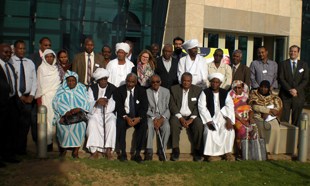A workshop focusing on technical legal aspects of the implementation and protection of the constitution was conducted in mid-March
The Max Planck Foundation convened the 3rd workshop in a series of workshops as part of the larger project on Constitutional Commitments in Sudan (“Constitutional Support in Sudan: Trust Building Measures“) from 16 to 18 March 2015, which is jointly funded by the German Federal Foreign Office and the European Union. The Max Planck Foundation invited a group of 24 Sudanese representatives of the various political parties and other civil society groups to the three-day workshop in Khartoum, Sudan, to discuss technical and legal aspects related to the implementation and protection of the constitution. The invite-only forum distinctly aimed at bringing together an inclusive and representative group of officials, policymakers and state and non-state actors representing the main political and social groups in Sudanese society committed towards a peaceful constitutional process. With regard to substantive topics, the workshop built on two preceding workshops and focused on essential aspects related to the relevant institutions, processes and mechanisms that are essential for ensuring the applicability, practicability, maintenance and overall respect of the constitution after its adoption. The Max Planck Foundation implemented the workshop with the support of two renowned Sudanese experts and one international expert who delivered substantive technical expertise based on their vast knowledge and experience.
The workshop was convened as an academic and technical workshop focussed on the specialised institutions and legal mechanisms that can be utilised to protect, and enforce compliance with, the constitution. Alongside the detailed comparative and technical presentations by experts, the format of the workshop was especially designed to provide a collegiate atmosphere and a conducive environment for dialogue through dedicated sessions, which enabled participants to multilaterally discuss the visions and policies of the parties and groups they represented, regarding the future of Sudan’s constitution across party-political and ideological lines. The Foundation succeeded in creating a neutral forum for inclusive dialogue, in which representatives of the various Sudanese political parties and social groups as well as the presenters were able to discuss issues of commonality as well as potentially divisive issues in an environment of mutual trust and respect. The workshop used technical discussions of a legal nature to imbibe within the participants a spirit of communication, trust and commitment. These efforts resulted in three days of lively discussions amongst the participants during the formal sessions and breaks, in which participants shared their individual viewpoints on the different matters as well as their commitment towards a peaceful constitutional process. At the same time, the activity essentially served to build the capacity of the participants regarding technical aspects of constitutional implementation and its protection. It was emphasized to the participants that the discussions in the workshops and essential knowledge obtained must be transferred beyond the workshop to the relevant stakeholders within their various political parties and groups.
The overall project aims to support Sudan’s National Dialogue process. The Max Planck Foundation intends to provide legal support and technical assistance to this profound National Dialogue process in Sudan through capacity building measures for an inclusive group of actors committed towards a peaceful constitutional process. Individual project activities include discussions on essential elements, the structure of constitutional processes and the structural and substantive design of the constitution. Ultimately, a successful National Dialogue can only be achieved through cooperation between participants and an inclusive process. Project activities thus use a comparative legal approach to promote and encourage discussions about options for constitutional arrangements between different interest groups. This requires building mutual trust on an on-going basis and increasing the confidence of participants amongst their peers and in the process as a whole through various activities, such as joint capacity building measures.

